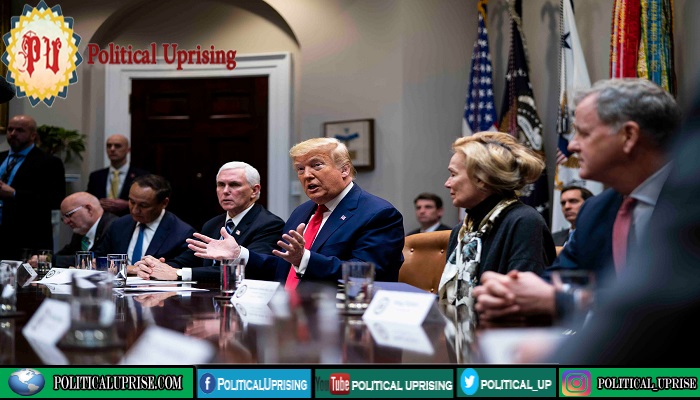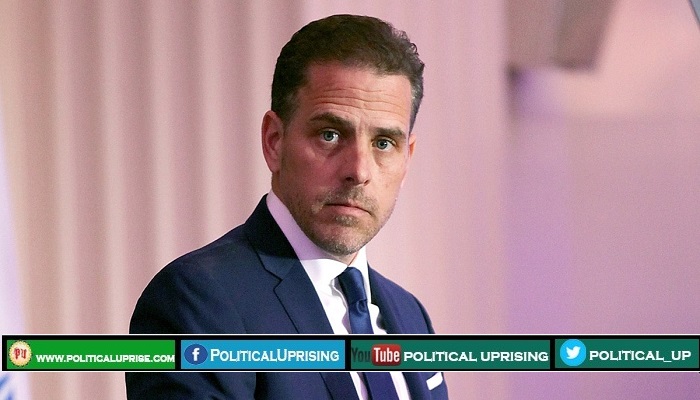US president efforts to rein in spy agencies,competing leaks of intelligence reports from White House and Congress signal ‘a deep undercurrent of distrust’.
United States President Donald Trump, adopting the mantle of “war-time president” in his struggle to contain the coronavirus outbreak, has wittingly or not opened an entirely new front in that war, one that critics of the president believe could hamper the US’s wider efforts to mitigate the pandemic.
Trump’s deep distrust of the US intelligence community, stretching as far back as the 2016 campaign and through to his impeachment earlier this year, has led him to purge officials he views as disloyal and shut down the contacts with Congress of those that remain.
Even as the president attempts to deflect criticism about his early response to the outbreak,reports are surfacing that those same intelligence officials warned him and his administration about the potential for widespread economic and social disruption from the coronavirus.
“This fiction that Trump has created about ‘We did everything perfectly and I knew it was a pandemic when I was saying it was no problem,’ is just ludicrous,” said Stephen Roach, a senior fellow at the Yale Jackson Institute for Global Affairs.
Trump defended his actions in the early days of the coronavirus
President Trump‘s comments and competing leaks of intelligence reports coming out of the White House and Congress signal “there is just a deep undercurrent of distrust”, Roach said.
As a practical matter, that distrust has resulted in a breakdown in the relationship between the intelligence agencies and oversight committees in Congress. Worse, there are increasing reports of a disconnect between the information and analysis intelligence agencies produced about the virus and what reached the president’s desk.
The politicisation of intelligence is sensitive within the professional ranks of agencies like the CIA, particularly following the skewed intelligence reporting that supported President George W Bush’s decision to invade Iraq in 2003.Indeed, distortion of analysis and facts to fit presidential preferences is a problem that has plagued US intelligence agents since the 1950s.
This week, tensions between the current administration and Democrats in Congress, who are eager to pin blame on the president for the outbreak, spilled into the open when House Intelligence Committee Chairman Adam Schiff accused Richard Grenell,the acting Director of National Intelligence, in a four-page letter of “political interference in the production and dissemination of intelligence”.
Grenell, borrowing a tactic frequently used by his boss, did not address the substance of Schiff’s complaint, but instead attacked the congressman for leaking the letter to a news outlet before he even received it.
“These press leaks politicising the intelligence community must stop,” Grenell tweeted.
The Office of the Director of National Intelligence is a czar-like position created by Congress to remedy the intelligence failures that led to the September 11 attacks.It oversees all US espionage and intelligence agencies and funnels their reports directly to the president.
World Health Organization warns against easing coronavirus measures
Trump named Grenell to replace the acting DNI Michael Maguire, a retired Navy admiral, whose acting role was set to expire at the end of the month.
Maguire had been a short-term replacement for former DNI Dan Coats, a statesmanlike figure who had been forced out after feuding with Trump over Russia, North Korea and ISIL (ISIS).
Trump said at the time Coats was sacked that his next pick for the top intelligence post would “rein in” US spy agencies that had “run amok”.
Newcomer Grenell’s lack of intelligence experience and political connections to Trump raised alarms among Democrats in Congress and outside observers.
With Grenell in charge, Trump has forced out every Senate-confirmed official within the DNI office and recently removed two senior career intelligence officials who were seen as insufficiently loyal.
Now, US intelligence agencies are being harnessed to support Trump‘s narrative namely that China is to blame for the global outbreak. A US intelligence community report provided to the White House but not Congress in late March concluded that China concealed the extent of the coronavirus outbreak and under-reported its number of cases.
The still-secret White House document was first reported by Bloomberg which cited three unnamed US officials.
Beijing responded by saying it had been “open and transparent” about the outbreak and accused the Trump administration of trying to shift blame from its own handling of the crisis.
Saudi-Russian price war lifts oil prices as ceasefire hopes raise
While Grenell’s appointment is starting to bear fruit for Trump, a troubling timeline of intelligence community warnings about the deadly pathogen is starting to emerge through a series of leaks to US media.
It suggests the Trump administration knew early on about the possibility of a pandemic.Worse, it appears Grenell did not tell Congress what US spy agencies knew until it was too late.
US intelligence officials began warning the Trump administration as early as late November and December that contagion was sweeping through China‘s Wuhan region.
The concerns were detailed by the US military’s National Center for Medical Intelligence, one of the agencies Trump placed under Grenell’s purview, according to ABC’s sources. The NCMI on Wednesday denied the ABC report, issuing a statement that “no such NCMI product exists”.
Trump told reporters on Wednesday he first learned of the seriousness of the threat the coronavirus posed to the US shortly before he placed travel limits on Chinese nationals on January 31.
By February, however, when alarming public reports were coming out of China about the outbreak, Trump was still downplaying the threat and asserting his newly cemented control over the Office of the DNI by delaying warnings to Congress about the virus. An annual public presentation to Congress of the top security threats facing the US was cancelled.
The first clear warning to Congress did not come until February 25 and even then, only in a classified briefing to senators from the acting Secretary of Homeland Security.
Trump’s disdain for the intelligence community was apparent in his decision on April 4 to fire the independent watchdog for the US intelligence agencies, Inspector General Michael Atkinson, the only official who could provide inside oversight of the DNI’s function.
While the move was seen as payback for Atkinson’s role in the Ukraine impeachment imbroglio Atkinson “took a fake report and gave it to Congress”, Trump complained it set off alarm bells in both the wider intelligence community and the halls of Congress.
A bipartisan group of eight senators warned Trump in a letter on Wednesday against the removal of Atkinson “without clear substantial reasons” and said the president’s action “circumvented Congress’s role”.
Schiff was more blunt. “At a time when our country is dealing with a national emergency and needs people in the Intelligence Community to speak truth to power, the president’s dead-of-night decision puts our country and national security at even greater risk,” he said.



